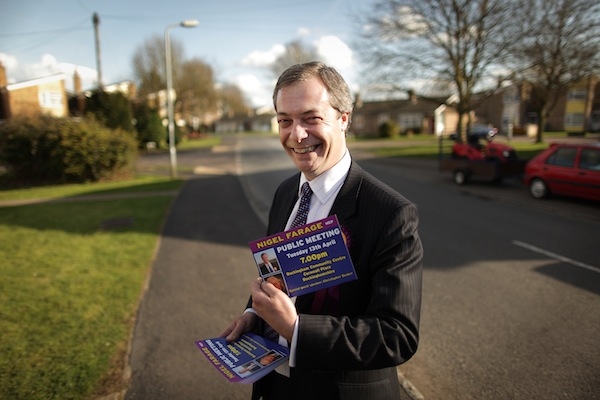‘Where do you expect to do well in these local elections?’ I asked the Ukip spokesman. ‘England!’ he boomed down the phone. On Wednesday afternoon, this seemed typical of Ukip’s bullish exuberance but judging by their predicted ‘phenomenal performance’ parts of Britain (like Boston) have become Ukipland overnight. Yesterday, I went to find some real Ukip voters in the Home Counties and discover why they have abandoned the three main parties.
Nigel Farage stood in Buckingham at the 2010 general election and received just 17 per cent of the vote against Commons speaker John Bercow. The county of Buckinghamshire was once solid blue territory, but this green and pleasant corner of England holds just the kind of Tory voters Farage thinks he can pick up because of their displeasure with David Cameron. And when I spotted this banner on the main road into Aylesbury I knew I’d arrived in Ukipland:

But aside from this, I was disappointed at the lack of Ukippers. Wandering through the town, there were no leafleters, posters or even flags. The party’s Aylesbury and Buckinghamshire HQ was a deserted townhouse without even a poster in the window. One Liberal Democrat councillor said of his purple foes, ‘they certainly make a lot of noise, especially on the high-speed line, but will anyone listen?’
At another polling station, I found the most young Tory who was hopeful of unseating a 30-year incumbent Lib Dem. When I asked the candidate how he had campaigned to win, he told me ‘by focusing hard on the local issues, and not mentioning David Cameron at all. Everyone hates the Tories around here’.
As I drove through the twisting lanes of Aylesbury Vale, I was surprised at the abundance of Conservative posters and placards. The death of the Tory grassroots appears to have been prematurely overspun by their opponents, or at least the local party was putting up a good fight, which suggests its campaigners are still loyal.
The village of Twyford is prime Ukip territory. It is a bucolic vision of England — children running around the village, a thriving pub, small ‘outstanding’ primary school and a co-operative village shop (run by 80 local volunteers working four hour shifts a week). All of which will be smashed apart when the High Speed 2 route is built 200 yards from the outer perimeter:

Not a single voter in Twyford — or in the nearby villages of Chetwoode, Charndon and Quainton — would reveal how they voted but when goaded on HS2, they all gave the game away. They were punishing the Tories en masse, and most stated an utter contempt for the three main parties. I questioned one voter why the area was so motivated by a single issue and was dragged to the edge of the village to see where the line would go:

The HS2 fixation reveals Ukip’s biggest strength and weakness. They’ve no doubt picked up a significant amount of votes in Buckinghamshire for their opposition but their opposition could be classed as opportunism. Ukip’s policy on High Speed rail isn’t as straightforward as the voters of Buckinghamshire would believe. As Jim Pickard of the Financial Times pointed out last week, Ukip actually promised in their 2010 manifesto ‘three new 200mph-plus high-speed rail lines’:
‘This would include a new line between London and Newcastle with a spur to Manchester, a London-Bristol-Exeter line and a linking route via Birmingham’
That sounds not too dissimilar to HS2, but without cutting through their beloved Chilterns. Ukip appear to resonate in Bucks purely because of their anti-political credentials, not their actual policies. One Tory told me that people were ‘voting Ukip today but will switch back to the Tories at the general election’. This seems a plausible trend — kick the establishment when it matters the least but still allow it to run the country. If this turns out to be true, it could halt Ukip’s rise after the European elections next year.
After scouring the countryside up to Bicester and back, I was hard-pressed to find any more signs of Ukip support, just anti-HS2 campaigning. Their impressive results in the elections must have more to do with national chatter than to a grassroots machine. When I quizzed the Ukip spokesman on Wednesday about how many seats they expected to pick up today, he responded ‘someone remarked to me we may win 100. It could be 10! It could be 135! Ukip manages to perplex not just the political parties but the psephologists too.’
Based on what I saw in Ukip heartland, a solid result today will not be down to a lean and mean local machine. Farage still has a lot of work to turn his anti-politics soapbox into a fully-fledged national political party but today’s results suggest they at least have the momentum to do so.






Comments